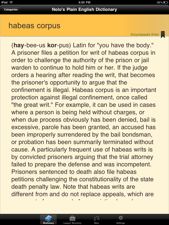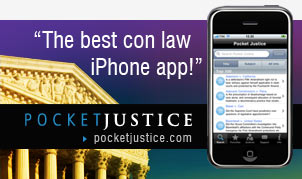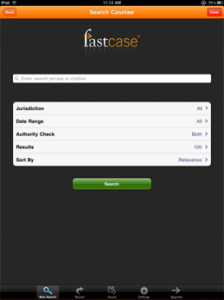 Recently, I had the chance to look through the online videos available at FedFlix. For those of you unfamiliar with FedFlix, it’s a joint venture between the folks at Public.Resource.Org and the National Technical Information Service (NTIS), a bureau within the Department of Commerce. Pursuant to their agreement, NTIS and other agencies, such as the National Archives, send public domain videotapes to Public.Resource.Org, which in turns digitizes the videos and uploads them to the Internet Archive, YouTube , and the Public.Resource.Org public domain stock footage video library. Public.Resource.Org then sends the videotapes back to the government along with a disc of the digitized video. At this point, the collection includes more than 1,500 videos from over 100 federal and state agencies and covers a wide-range of topics. For purposes of this post, I thought it might be interesting to browse through the available videos related to law, in particular the offerings from the Department of Justice, the Federal Judicial Center and the National Archives. What follows are just a few of the highlights from my search – check out more for yourself when you have time!
Recently, I had the chance to look through the online videos available at FedFlix. For those of you unfamiliar with FedFlix, it’s a joint venture between the folks at Public.Resource.Org and the National Technical Information Service (NTIS), a bureau within the Department of Commerce. Pursuant to their agreement, NTIS and other agencies, such as the National Archives, send public domain videotapes to Public.Resource.Org, which in turns digitizes the videos and uploads them to the Internet Archive, YouTube , and the Public.Resource.Org public domain stock footage video library. Public.Resource.Org then sends the videotapes back to the government along with a disc of the digitized video. At this point, the collection includes more than 1,500 videos from over 100 federal and state agencies and covers a wide-range of topics. For purposes of this post, I thought it might be interesting to browse through the available videos related to law, in particular the offerings from the Department of Justice, the Federal Judicial Center and the National Archives. What follows are just a few of the highlights from my search – check out more for yourself when you have time!
Articles Posted in Technology
 Sometimes people mistake Justia’s mission, “To advance the availability of legal resources for the benefit of society,” as being only about advancing the availability of legal resources for lawyers, but society is much larger then the legal community. This week’s App of the week is free for the iPhone and iPad from our friends at Nolo, and it’s geared at making the often confusing landscape of legal terms easier to understand for everyone.
Sometimes people mistake Justia’s mission, “To advance the availability of legal resources for the benefit of society,” as being only about advancing the availability of legal resources for lawyers, but society is much larger then the legal community. This week’s App of the week is free for the iPhone and iPad from our friends at Nolo, and it’s geared at making the often confusing landscape of legal terms easier to understand for everyone.
I am not a lawyer myself, nor have I gone to law school. I came to Justia as a programmer. While I have learned much about the law since I started working here in 2006, I still find myself constantly coming up against legal terms that I don’t know. There are a few places I turn to find out what those words and phrases mean discreetly so when the lawyers in my midst say them I can pretend I knew what it was all along, and one of the best sources I’ve found is Nolo’s Plain English Legal Dictionary available for free at nolo.com/dictionary.
OnGuard Online, a website by the Federal Trade Commission, urges people to exercise discretion when using social networking sites. While their advice is targeted towards parents of young children, it applies equally to people of all ages.
In general, the FTC cautions people to only post information to social networking sites that they are comfortable with others seeing. While the FTC recommends the use of privacy settings to restrict access to your social networking profile, we would add that once you send an e-mail or post a message or photo on your social networking page, this information can easily be viewed by or forwarded to persons outside of your intended network, regardless of your privacy settings.
Do you like free, quick access to case law and codes? Of course you do. What’s not to like?
With an iPad or iPhone, you can download the free Fastcase app to research state and federal court opinions, as well as find state and federal codes.
That’s right, it costs you and your firm nothing. Nada. Rien. Zilch. You pay nothing to get it, and nothing to use it. No other legal app out there gives lawyers and legal professionals this much portable legal research, convenience, and speed for virtually nothing.
Today, the Justia Law, Technology & Legal Marketing Blog will begin a new series of articles focused on useful legal-related smartphone applications. As my colleagues have mentioned, the United States Supreme Court is back in session this week, and as such it seems fitting to begin our App of the Week series with an application that’s all about the Supreme Court: PocketJustice by our friends at Oyez.
 PocketJustice is currently available in both a free “Top 100 Cases” edition and a “Full Set” edition for $4.99 for the iPhone and iPod touch mobile devices. An iPad optimized version will be coming soon.
PocketJustice is currently available in both a free “Top 100 Cases” edition and a “Full Set” edition for $4.99 for the iPhone and iPod touch mobile devices. An iPad optimized version will be coming soon.
Both the free and full editions make it easy to find information about constitutional law cases decided by the US Supreme Court.

